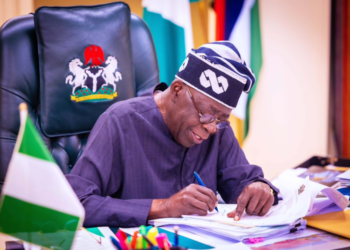The Nigerian National Petroleum Company (NNPC) Limited has announced the termination of its crude-for-petrol swap deals, known as Direct Sale Direct Purchase (DSDP) contracts, with foreign refiners and traders. In an interview with Reuters, Mallam Mele Kyari, the Group Chief Executive Officer of NNPC, disclosed that the company will now make cash payments for petrol imports. He further revealed that Nigeria’s private oil marketing companies may import petrol as early as this month.
The decision to terminate the DSDP contracts is part of a broader plan by the Nigerian government to deregulate the petrol market and alleviate the financial burden of subsidy payments. Since 2016, NNPC had been importing petrol through consortiums of foreign and local trading firms, repaying them with crude oil due to a lack of funds for cash purchases.
As Africa’s largest crude producer, Nigeria heavily relies on imports for its refined products, as its refineries have been operating at reduced capacities. However, a decrease in oil production last year, combined with high global fuel prices resulting from the conflict in Ukraine, significantly increased NNPC’s debt to traders. According to an NNPC report to the Federation Account Allocation Committee in September 2022, the company owed the consortiums approximately $2 billion.
Despite terminating the crude swap contracts, NNPC continues to allocate crude for fuel swaps for July loading, albeit in smaller quantities than in previous months, according to an industry source familiar with the matter. In its March report on crude oil loadings, NNPC allocated crude to the swap contracts held by the consortiums.
Kyari emphasized that NNPC’s monopoly on petrol supplies is ending, paving the way for private companies to begin importing petrol. He also stated that Nigeria’s total crude and condensate output was approximately 1.56 million barrels per day as of Friday.
However, Nigeria faces challenges in meeting its oil quota set by the Organization of Petroleum Exporting Countries (OPEC) due to oil theft and illegal refining. These obstacles raise concerns about whether Nigeria can fulfill the supply requirements of the recently inaugurated Dangote Refinery, which has a contract with NNPC to receive 300,000 barrels per day.
Last week, NNPC adjusted the pump price of petrol by nearly 200 percent, raising it from N195 per litre to a range of N488 to N557 nationwide. This adjustment came after the government’s announcement that fuel subsidy was abolished. The expected savings from this move are intended to be redirected to sectors such as education and health.
However, the Nigeria Labour Congress (NLC) expressed its discontent with the new pricing template, describing it as vexatious. Consequently, the NLC has declared plans to initiate a nationwide strike starting from Wednesday.
The termination of the crude-for-petrol swap deals by NNPC marks a significant shift in Nigeria’s approach to petrol imports, as the company embraces cash payments and opens the market to private firms. The impact of these changes on the Nigerian economy and fuel sector remains to be seen, especially considering the ongoing concerns surrounding oil theft and the planned strike by the NLC.










